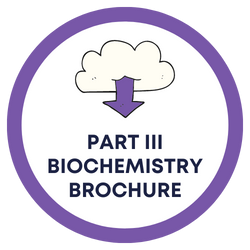|
Aims
The course aims to build on Part II Biochemistry to deepen and extend your knowledge and understanding of the scientific method and process. Two further selected specialised aspects of biochemistry will be studied by means of a lecture course. Research skills and knowledge of research techniques and instrumentation will be developed by means of lecture courses, seminar series and a two-term research project.
Specialised Advanced Topics
The course aims to enable students to achieve research level knowledge and integrated understanding within two of the following specialisms:
|
Module MT1: Molecular Recognition and Interaction
Lectures present case studies in precisely understood contexts, within broad themes of protein-protein recognition (e.g. in molecular signalling), protein-nucleic acid recognition (e.g. in the RNA degradosome and DNA repair) and protein-small molecule recognition (e.g. in molecular assembly lines and drug screening).
|
|
Module MT2: Cell Fate
How the developmental paths of cells are controlled and can be manipulated. Our current biochemical understanding of how ageing and life span are influenced.
|
|
Module LT1: Contemporary Cancer Studies
This module will look at a series of recent advances in our molecular understanding of cancer studies, with a combination of lectures and workshop-style discussions.
|
|
Module LT2: The Biochemistry and Biophysics of Neuronal and Metabolic Disorders
This module will show how molecular and systems approaches can further understanding of diseases that perturb metabolic integration, cardiovascular function and neurotransmitter and hormonal signalling. Contexts will include circadian and cardiac rhythm disturbance, neuronal disorders, obesity, and thrombotic disease.
|
Seminar Series on Scientific Method and Experimental Design
-
The overall aim is to develop your understanding of scientific method and process - the development of hypotheses, and the choice of experimental systems and the design of experimental tests of the hypotheses. There will be two complementary approaches: looking at deployment of methodological resources and discussion of landmark papers.
Research Skills
-
The course aims to provide further training in research skills through the provision of a two term research project for each student, complemented by lecture courses on applications of biochemical techniques.
-
Students are required to construct slide-based presentations of their projects and present these to an expert audience in a formal colloquium.
-
In addition, there are two journal clubs which guide the student through a detailed analysis of a research paper.
Analytical and Presentational Skills
The course aims to provide the students with analytical and presentational skills. This will be achieved in classes and small group teaching by the student undertaking:
- A critical review of a paper in the literature and oral presentation of the analysis.
- Research and oral presentation of contemporary biochemical topics.
- A problem-solving approach to experimental data.
|
|
Objectives
Specialised Advanced Topics
By the end of the course, students should be able to demonstrate advanced knowledge and understanding in two of the following:
Proteins, Nucleic Acids and Their Interactions
- Including the structural principles of protein-protein, nucleic acid-protein and protein-small ligand interactions; the experimental approaches used to investigate them and the exploitation of small molecules as tools and drugs.
or
Cell Fate
- Including stem cell biology, self-renewal and differentiation; basis of Alzheimer’s disease, Parkinson’s disease, motor neuron disease and Huntington’s; theories of cellular ageing and senescence, use of animal models and genetics of ageing.
|
Cancer studies
- Including cell cycle and cancer, use of mouse models, genome-wide sequencing and genome-wide disease association, leukaemia, p53, cancer therapeutics, recombinant antibody generation, commercial drug design and development, in vivo imaging.
or
The Biochemistry and Biophysics of Neuronal and Metabolic Disorders
- Including molecular mechanisms underlying the regulation circadian rhythms, obesity, neurotransmitter receptor signalling, channelopathies, and cardiovascular diseases.
|
Research Skills
By the end of the course, students should be able to:
-
Demonstrate knowledge of the objective, methods, results and conclusions of their research project by means of interim and final oral reports to their peers.
-
Demonstrate knowledge of the written presentation of research through the production of a written report on their research project.
-
Demonstrate knowledge and understanding of the application of selected techniques to biochemical research by means of a written examination.
-
Demonstrate critical evaluation of research data in a written examination.
Analytical, Integrative and Presentational Skills
By the end of the course students should be able to:
-
Critically analyse and evaluate biochemical research articles.
-
Research and present orally contemporary biochemical topics.
-
Research and present orally an analysis of an original paper.
-
Integrate knowledge and understanding from their whole undergraduate experience of Biochemistry by means of an essay in a written examination.
|


